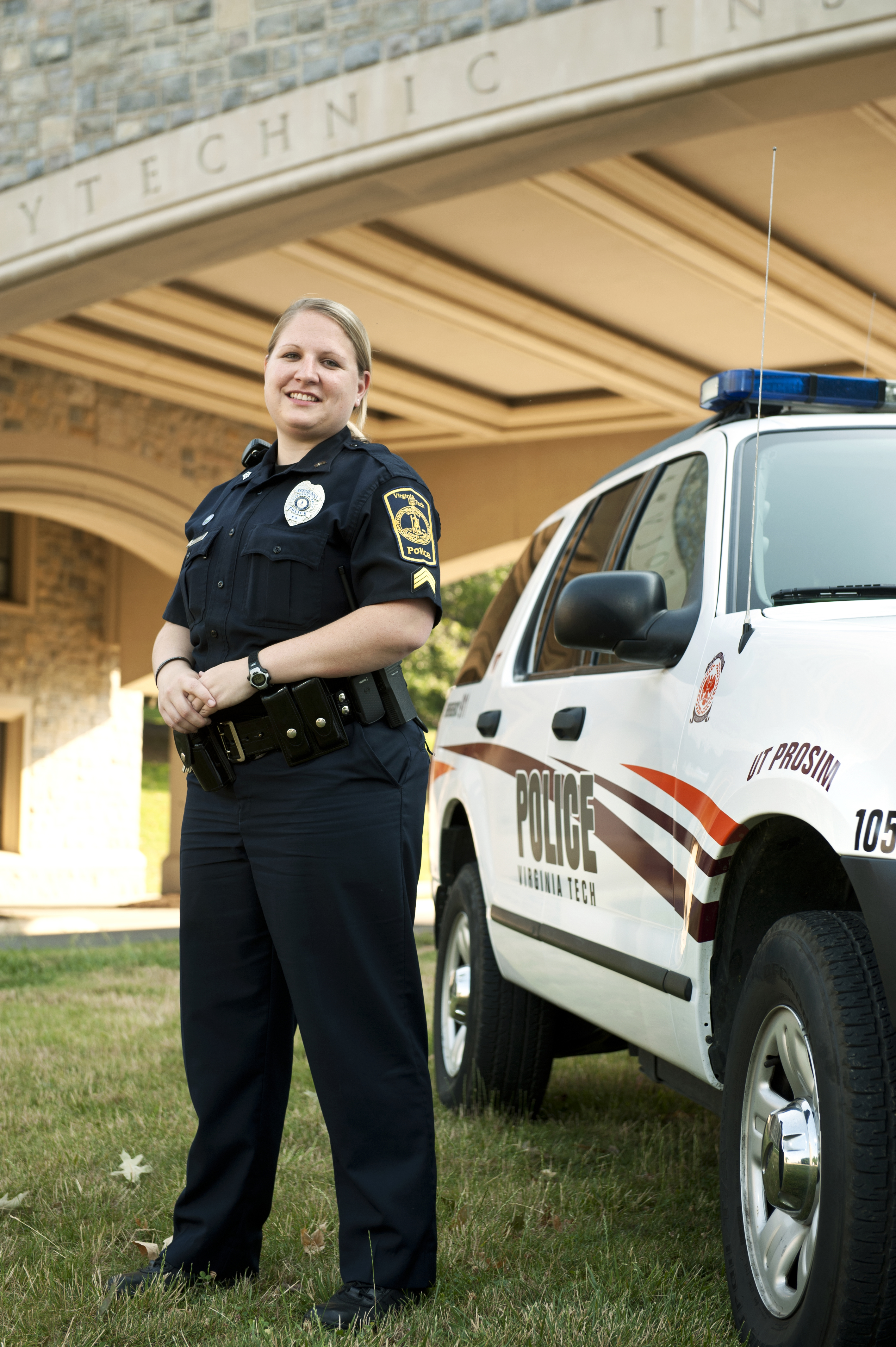Officer finds gratification in challenges of police work

Many freshmen enter college without a firm decision on what their major will be, which was the case with Katie Biniek, now a graduate student in the Center for Public Administration and Policy in the College of Architecture and Urban Studies.
Biniek, perhaps better known now around campus as Sgt. Biniek of the Virginia Tech Police Department, ended up majoring in sociology and took a number of courses related to crime and deviance while an undergraduate student at Virginia Tech. This led her to participate in several programs offered by the university police department such as the Student’s Police Academy.
As a free, one-credit course, the academy gives students from all majors an inside look at the duties of law enforcement. In addition to classroom instruction, students conduct a mock crime scene investigation, learn about police dogs, practice driving a squad car (off road), and experience at a shooting range, among others.
“When they complete the academy, most of them have a heightened awareness and appreciation for the inner workings of the department and what we do,” she said.
The academy offers a summer session for interested faculty and staff.
During her senior year, Biniek was a student intern in the department where she became familiar with various roles and day-to-day operations. She was so dedicated to her aspiration that she completed twice as many hours as were required for interns.
“Instead of going out partying, I was working at the police department,” she said.
In 2008, Biniek not only earned her bachelor’s degree but also graduated with practical experience that helped her land a full-time job as an officer in the department. As with all new officers, she was trained at the Cardinal Police Academy, and after four years of service, Biniek was promoted to the rank of sergeant earlier this year.
Biniek is one of eight females in a department of 52 officers.
“Being a female in the field of police work can be difficult at times,” she said. “Some people don’t expect us to be able to handle the job, but we’ve all helped each other in the department.”
Biniek is an instructor in the department’s Rape Aggression Defense program, a popular class open to any female at the university. The program consists of realistic, self-defense tactics, and techniques. It is a comprehensive course that begins with awareness, prevention, risk reduction and avoidance, and progresses on to the basics of hands-on defense training.
“Taking the class builds confidence and an ‘I can’ attitude,” she said. “With the techniques learned in this class, anyone — even a petite female — can escape an aggressor.”
Another service that the department offers, which few people may realize, is a residence life resources program. Three officers are dedicated solely to working with students and resident advisors to help them maintain a safe environment while living on campus. Residence life officers conduct safety and awareness programs in the dorms, encouraging students to have fun, but still be safe.
Biniek has found the saying “nothing is routine” to be especially applicable to police work.
“We see and deal with all kinds of crazy stuff,” she said. “But I think as law enforcement officers, we are all dedicated, patient, and very passionate about helping people. My greatest satisfaction at the end of the day is knowing that maybe I’ve made someone’s day better.”
The nationally accredited Virginia Tech Police Department strives to enhance the safety and quality of life for students, faculty, staff, and visitors through effective law enforcement and proactive crime prevention in partnership with the university community. The department has been serving Virginia Tech since 1945.
Dedicated to its motto, Ut Prosim (That I May Serve), Virginia Tech takes a hands-on, engaging approach to education, preparing scholars to be leaders in their fields and communities. As the commonwealth’s most comprehensive university and its leading research institution, Virginia Tech offers 240 undergraduate and graduate degree programs to more than 31,000 students and manages a research portfolio of $513 million. The university fulfills its land-grant mission of transforming knowledge to practice through technological leadership and by fueling economic growth and job creation locally, regionally, and across Virginia.




